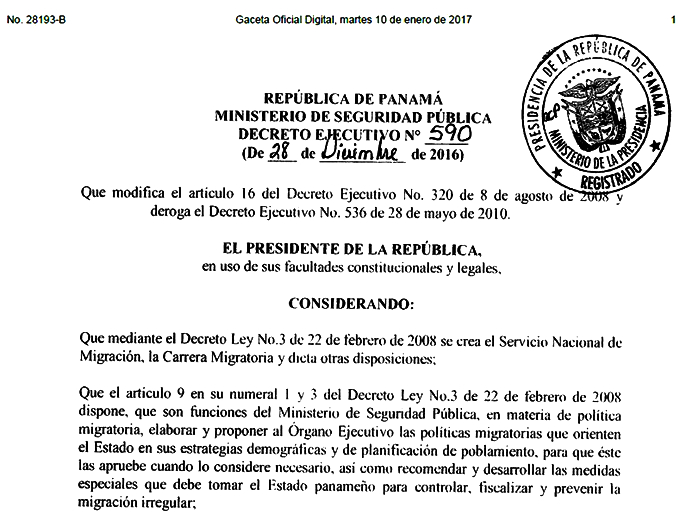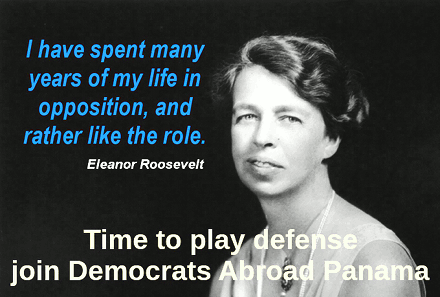
Varela shortens tourist stays and residency processing period but rejects PRD extremes
by Eric Jackson
In the face of virulent xenophobia and proposals of draconian changes to Panama’s immigration laws, President Varela has tightened up a couple of the regulations that implement the existing laws, without touching the laws themselves. In 2010 the Martinelli administration lengthened the stay on a tourist visa from three months to six months, and the current administration has moved it back to three months. Those applying for resident or pensionado visas used to be able to stay for a year while the paperwork was underway. Now it’s six months and such folks have to pay $50 for the temporary ID card that goes with that status. In the decree adjusting these regulations, the reduction in waiting time for a resident’s or pensioner’s visa it is said that these days it doesn’t take more than six months to process the paperwork.
The decree appears to be at least partly aimed at heading off proposals by PRD legislators Elias Castillo and Zulay Rodríguez, which the deputies have described but which have not been published. They would shorten tourist visas to 30 days and allow only one return, ending legal “permanent tourism” and curbing many other sorts of tourism as well. They would also require tourists to register with and stay at hotels, and if found not to be staying at the hotels where they said that they would stay would subject them to arrest.
Rodríguez is quite open about wanting to prohibit foreigners, tourists or otherwise. She and her followers vilify all foreigners as criminals, spitting special venom at Venezuelans and Colombians but attacking the North Americans and Europeans who come here as well. Will she try to ride this campaign in to the presidency in 2019? Her problem with changing the immigration laws, beyond the damage that they would do to the Panamanian economy, is that her colleagues by and large can’t stand her and hesitate to do anything that would boost her politician fortunes. Although she was recently elected to head the women’s branch of the Democratic Revolutionary Party, many of her fellow PRD deputies also disdain her. For example, Rodríguez has charged another PRD legislator, Javier “Patacón” Ortega, with criminal defamation for describing her as “a person with mental problems, a crazy schizophrenic.” Across the aisle, Panameñista deputy Popi Varela — the president’s brother — said that “what comes from her mouth is trash.” Trash talk does, however, have a substantial following.
Let’s brush away the semantics and the fake news. “Permanent tourists” are a species of residents who live in Panama on tourist visas, leaving every so often and then returning on new visas. This is legal. There may be some who come here to commit crimes — which is illegal — but these are a small minority. The great majority of crimes committed in Panama are committed by Panamanians. Most foreigners in Panama do their best to avoid trouble.
Like standard tourists, the permanent tourists spend money in the Panamanian economy. Many rent or buy or build homes — which is legal. Some start businesses — which is generally legal. Many work for somebody else — which is generally illegal. Many hire Panamanians — which is legal and encouraged.
Why does somebody live the life of a permanent tourist here? Most would get resident or pensionado visas but can’t show enough of the accepted sorts of wealth or income to qualify. Some have criminal records that would bar them from residency. Some are hiding from creditors elsewhere. Generally they have to show a plane ticket back to the country from whence they came to get in as a tourist, such that if they come upon hard times or illness they are sent back to be some other country’s burden.
“Tourism,” whether of a traditional kind or thinly disguised residency, is big business here, more than seven percent of the Panamanian economy. Rich white people staying in expensive hotels? That’s the stereotypical ideal, which, judging from the occupancy rates of hotels that chase that market segment, is except for a few weeks per year a failure. Niche markets — young backpackers without much money, but who may come back in a few years when they have more money to spend, or people of the Panamanian diaspora who come back to visit family and friends and don’t stay in hotels, for two examples of many — are important to the industry as a whole if not to the hotels that bill themselves as five-star. The World Travel and Tourism Council estimated that in 2014 more than 135,000 Panamanian jobs directly depended on tourism.
Restrictive laws, unfriendly statements by public officials and the behavior of belligerent citizens can adversely affect a publicity sensitive industry like tourism. On the other hand, a perception that public policies work for the benefit of foreigners rather than citizens is toxic to the career of any politician who gets blamed for such policies. It appears that President Varela’s decree seeks to balance these concerns, as well has to head Zulay off at the pass. Tourism Minister Gustavo Him, however, avoids the partisan spins. He opposes the sorts of restrictions for which Castillo and Rodríguez call, he said, because “anything that reduces the possibility of tourists coming is worrisome.”
~ ~ ~
These announcements are interactive. Click on them for more information.










